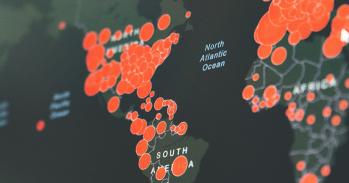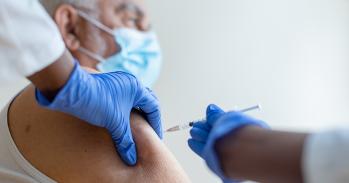
A newly designated Collaborating Centre at the University of Cambridge will support the World Health Organization (WHO) in detecting and responding to major epidemic- and pandemic-prone diseases.
A newly designated Collaborating Centre at the University of Cambridge will support the World Health Organization (WHO) in detecting and responding to major epidemic- and pandemic-prone diseases.
Our WHO Collaborating Centre is in the privileged position of informing public health initiatives through highly translational scientific research.
Professor Derek Smith
The WHO Collaborating Centre for Modelling, Evolution and Control of Emerging Infectious Diseases recognises the work of Cambridge researchers who work in this area.
The Centre, directed by Professor Derek Smith in the Department of Zoology, has pan-university and highly interdisciplinary activities with members of the Department of Zoology, Department of Pathology and Department of Veterinary Medicine in the School of Biological Sciences, members of the School of Clinical Medicine, and also from the Department of Architecture and Computer Laboratory.
The Centre is linked with researchers throughout the world and is concerned with global infectious disease issues that affect not only the developed world, but also the developing world. For example the Centre has close cooperation with the Cambridge in Africa program, in particular on researching the dengue virus.
One of the long-standing activities of the Collaborating Centre is to provide support for WHO activities in the global surveillance of influenza and other pathogens – including dengue and enterovirus 71 – as well as recommendations on suitable vaccine strains for use in these and other emerging and re-emerging diseases.
Each year, influenza infects 5–15% of the world’s population and kills up to half a million people – a figure that can rise to many millions in the event of a pandemic. Spearheading the annual race to identify the best vaccine to combat seasonal flu, the WHO collates information about the flu viruses in circulation worldwide in the preceding months.
As part of this process, Dr Colin Russell in the Department of Zoology curates a global database of information on the rapidly changing variations (called antigenic differences) in the influenza coat protein – the part that makes it difficult for our immune system to recognise flu from one year to the next.
“Our WHO Collaborating Centre is in the privileged position of informing public health initiatives through highly translational scientific research, using technology that allows real-time detection of circulating viruses that escape protection conferred by current vaccines,” said Smith.
The Centre uses a technique called antigenic cartography developed by Smith with Dr Alan Lapedes (Los Alamos National Laboratory, New Mexico) and Professor Ron Fouchier (Erasmus Medical Center, Rotterdam). The technique analyses antigenic differences between pathogens, allowing real-time detection of circulating viruses that escape protection conferred by current vaccine strains. “Antigenic maps allow us to make sense of vast amounts of difficult binding assay data. One can see at a glance the global picture of decades of viral evolution,” added Smith.
In addition, the Centre carries out research on the evolution of pandemic influenza. “We can start asking questions such as how close is nature to evolving an aerosol-transmissible form of bird flu that can be transmitted from human to human, as opposed to the varieties we have seen so far that have been passed to individuals in close contact with infected birds,” said Smith.
The work of the Centre is underpinned by the activities of Cambridge Infectious Diseases, a multidisciplinary community of researchers that promotes, develops and supports initiatives which focus on infectious diseases.
WHO Collaborating Centres are designated by the WHO Director-General to carry out activities in support of the Organization’s programmes on areas such as nursing, occupational health, communicable diseases, nutrition, mental health, chronic diseases and health technologies.
For more information, please visit www.whocc.infectiousdisease.cam.ac.uk/ or download the WHO Collaborating Centre for Modelling, Evolution and Control of Emerging Infectious Diseases brochure.
This work is licensed under a Creative Commons Licence. If you use this content on your site please link back to this page.





